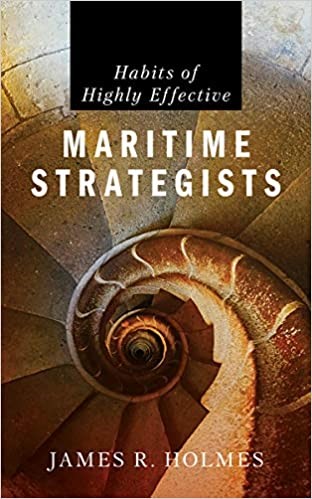
Habits of Highly Effective Maritime Strategists. By James R. Holmes. Naval Institute Press, Annapolis, Maryland, 2021.
Reviewed by Dr John Reeve
James Holmes is well known as a leading naval-maritime strategist whose writings on contemporary Indo-Pacific naval rivalries have been widely discussed. His latest book, something of a sequel and companion volume to his A Brief Guide to Maritime Strategy (Naval Institute Press, 2019), has a different scope and purpose.
The earlier book was a reflective and selective distillation of maritime strategic theory for the young and budding professional reader, both military and civilian, in changing times. This book, also a primer, focuses on questions of strategic leadership, and on ways in which the individual commander can develop the intellectual and professional habits with which to address them. Like the earlier book, it is informed by the same belief in lifelong learning, but is more eclectic in its sources, drawing upon history, biography, philosophy and strategic theory. It is concerned with the military generally, although drawing mostly upon the maritime context. It is more of a personal essay, and less of a theoretical handbook, than the previous work. Above all, it explicitly encourages intellectual heterodoxy, discord and debate. This is of course what navies need in an era of geopolitical, technological and strategic flux coinciding with intense competition for resources.
Holmes takes a flexible and open-ended approach to defining strategy. He sees it as ‘the art and science of using power to fulfill purposes’. This encompasses elements of policy, military planning and practical execution from the level of political leadership down to the business of fleet movements. He recognizes that the different conceptual levels of strategy are ultimately artificial constructs.
The first chapter draws upon classical philosophy, particularly Aristotle, to argue that strategists should inculcate within themselves certain habits, based upon tried and tested virtues, which make for strategic excellence, while simultaneously avoiding characteristics which have made for failure. These virtues include rational self-mastery, a less rational questing spirit, and continuing self-education to prevent intellectual stagnation. Holmes encourages students of strategy to enrich their intellectual capital by ‘reading about strategic theory, biography, military and diplomatic history, and literature of all kinds. Nor should they disdain fiction, sports, or popular culture. Wisdom is where you find it.’ This is a wise as well as literate approach which brings to mind the dictum of Bismarck: that only a fool learns from his own mistakes; the wise man learns from the mistakes of others. Holmes also draws on Clausewitz in terms of the need for the senior commander to understand domestic political terrain and, while respecting political superiors, to be active within it as necessary.
Two further chapters address the peacetime businesses of force structuring and military diplomacy. Citing Sun Tzu, Clausewitz, Mahan, Corbett, Liddell Hart and others, as well as various episodes in military history ancient and modern, Holmes sets out, amongst other things, the multiple merits of winning without violence; the issues in preparing for war, especially maritime war involving the maintenance of supply chains; the need to keep strategic ends, ways and means in alignment, and to envision the nature of subsequent peace even while preparing for possible conflict. He explores the simultaneous necessity and fallibility of planning; the way navies can fall victim to the victory disease; and how bureaucracy can be inimical to strategic debate and currency. He elucidates the psychological nature of peacetime alliances, competition and deterrence and the strategic nature of grey-zone warfare. Holmes is perceptive about how strategy is ultimately a rhetorical art, a matter of creating a persuasive narrative which will win over powerful elites and popular opinion, and therefore of linguistic and political skills. This was indeed the art at which Mahan and Corbett excelled. Holmes cites the introduction of academic maritime history at the Naval War College in the 1950s, inspired by J C Wylie, which was galvanized not simply by the need to understand sea power, but by the political difficulties experienced by the Navy in justifying its existence following the Second World War.
A final chapter considers strategic habits called for in wartime and the eventual transition to peacetime international relations. Holmes cites the Roman stoics, boldly taking issue with both Aristotle and Clausewitz in arguing that self-mastery – of human frailty and passion – ranks higher than physical and moral courage as the prime virtue in war. His case study is Alcibiades, politically and militarily brilliant but self-indulgent, who played a major role in the ruin of Athens during the Peloponnesian War. He contrasts Washington’s self-discipline, strategic focus and political leadership which brought success despite mediocre tactical skills. For Holmes this was the victory of reason over passion. One might debate the point. The art historian Kenneth Clark, for example, said he could not distinguish between emotion and reason. In the military context, self-mastery may be impossible without an underlying and passionate commitment to values or a cause. Holmes also gives, inter alia, a useful summary of Clausewitz’s view of military genius, reflexive intuition, and the ‘inner eye’ and ‘inward fire’ of leadership.
The wisdom of this book is in its belief in the need to begin a journey of reading and reflection; in its lack of schematic theory and dogma; in its intuitive understanding that professional military experience is intellectual as well as practical; and in its recognition that the human habits, in other words the culture, of a military service are more powerful and enduring than any military plan, corporate scheme or regulatory framework. The book is handily pocket-sized and certainly recommended.



